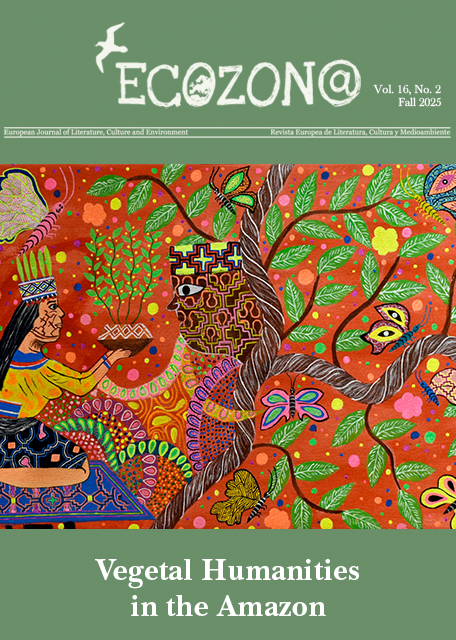Transcorporeality: An interview with Stacy Alaimo
DOI:
https://doi.org/10.37536/ECOZONA.2020.11.2.3478Schlagworte:
Stacy Alaimo, transcorporeality, new materialism, ocean ecologies, agency, anthropocene, Baltic sea, COVID-19Abstract
The interview was mainly conducted at Tallinn University in January 2019, when Stacy Alaimo visited the Graduate Winter School “The Humanities and Posthumanities: New Ways of Being Human” and gave a plenary lecture titled “Onto-epistemologies for the Anthropocene, or Who will be the Subject of the Posthumanities?”, and completed in spring 2020, to address immediately unfolding issues.
Alaimo is an internationally recognized scholar of American literature, ecocultural theory, environmental humanities, science studies, gender theory, and new materialism. She is the author of three monographs on environmental theory and ecocultural studies: Undomesticated Ground: Recasting Nature as Feminist Space (Cornell University Press, 2000); Bodily Natures: Science, Environment, and the Material Self (Indiana University Press, 2010); and Exposed: Environmental Politics and Pleasures in Posthuman Times (University of Minnesota Press, 2016). Alaimo has edited and co-edited essay collections, including Science Studies and the Blue Humanities (essay cluster for SLSA journal, Configurations. Fall 2019); Matter (MacMillan Interdisciplinary Handbooks, 2017); Material Feminisms (with Susan Hekman, Indiana University Press, 2008), and is the author of a significant number of essays and book chapters. She co-edits a book series, “Elements,” at Duke University Press. Her current work focuses on oceans and marine life: she is currently finishing a book tentatively titled, Composing Blue Ecologies: Science, Aesthetics, and the Creatures of the Abyss. Alaimo served as co-President of ASLE (The Association for the Study of Literature and Environment), and created and directed the cross-disciplinary minor in Environmental and Sustainability Studies at the University of Texas and Arlington. She joined the faculty of the University of Oregon in 2019, where she is Professor of English and core faculty member in environmental studies.
The interview addresses the evolution of her views as represented in Undomesticated Ground (2000), as well as the connections and tensions of feminism and environmentalism; it moves on to Bodily Natures (2010), in which she develops her seminal concept of transcorporeality; and looks into her ongoing interest in the deep sea and its representation in culture, the focus of her current book project, Composing Blue Ecologies.
The interview discusses the importance of transcorporeality in the Anthropocene, as an alternative to “self-aggrandizing” accounts “in which some transhistorical ‘Man’ acts upon the inert, external matter of the world.” Examples from both science and culture illustrate the concepts discussed, reaching out into important political concerns of the day, such as climate refugees, sustainability as a labour and power issue, divisive dichotomies and understanding difference. The theme of water as an example of transcorporeality and a burning ecological issue is taken up, touching upon the current vulnerability of the Baltic Sea and elaborating on the material and ideas developed in the new book that Stacy Alaimo is working on. The final part of the interview addresses the environmental implications of the COVID-19 crisis.
Downloads
Downloads
Veröffentlicht
Ausgabe
Rubrik
Lizenz
Authors who publish with this journal agree to the following terms:
a) Authors retain copyright and grant the journal right of first publication with the work simultaneously licensed under a Creative Commons Attribution License that allows others to share the work with an acknowledgement of the work's authorship and initial publication in this journal (CC BY-NC for articles and CC BY-NC-ND for creative work, unless author requests otherwise.
b) Authors are able to enter into separate, additional contractual arrangements for the non-exclusive distribution of the journal's published version of the work (e.g., post it to an institutional repository or publish it in a book), with an acknowledgement of its initial publication in this journal.
c) Authors are permitted and encouraged to post their work online (e.g., in institutional repositories or on their website) prior to and during the submission process, as it can lead to productive exchanges, as well as earlier and greater citation of published work (See The Effect of Open Access).










